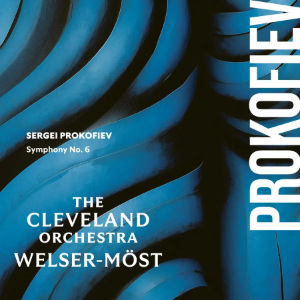
Sergei Prokofiev (1891-1953)
Symphony No 6 in E-flat minor, Op 111
Cleveland Orchestra/Franz Welser-Möst
rec. live, 28 September & 1 October 2023, Mandel Concert Hall, Severance Music Center, Cleveland, USA
Reviewed as a digital download of WAV files from a press preview
The Cleveland Orchestra TCO0010 [41]
The relative neglect of Prokofiev’s penultimate symphony is both understandable and yet a great pity. It is an austere work that is virtually the flip side of its more celebrated younger twin, the Fifth. Both are war symphonies- one heroic, the other, the later of the two, laments the dead and, perhaps more significantly, the wounded, physically and spiritually, of the Second World War. There is a report of the musicians at the premiere wanting more by way of commentary on the work from the composer so difficult did they find it to get to grips with. Such gnomic comments as did emerge from Prokofiev – the reminiscences of the first movement toward the end of the finale were deemed “questions cast into eternity” – scarcely helped. For myself, I have found Mravinsky’s comment on the work that its music “spanned one horizon to the other” more useful in helping me get a foothold on a work that has serious claims to being Prokofiev’s finest symphony. That sense of space which it shares with his previous symphony now evokes a huge and desolate and largely de-peopled steppe. Not least of the peculiarities of the work is how close it comes at various points to Vaughan Williams’ war and aftermath of war symphonies (5&6 respectively). Listen to the winding sinuous threnody that is the main subject of the first movement to see what I mean.
I have been lucky to review most of the recent own label recordings that have emerged over the last few years from Cleveland. Welser-Möst and his superb orchestra have form in Prokofiev with their 2023 release of the Fifth joining the very best at the top of my list of recommendable recordings of a work that has not always been that fortunate in the studio. That pedigree shines through in this new recording too. The Austrian, typically for him, avoids any special pleading upon behalf of the symphony. The result is light on drama but certainly catches the character of the music as a homage of sorts to the great symphonic tradition of Beethoven that Prokofiev intended. This is not Prokofiev in picaresque or charming mode. It isn’t hard to hear what provoked one early reviewer to comment that it had “the depth of Shostakovich”. The terrifying return of the material from the first movement in the finale I mentioned earlier is here like the sudden emergence of a death’s head skull in the midst of a victory parade. The seemingly jolly finale never really recovers and the end feels like reeling from a trauma as surely Prokofiev intended.
The pill, as it were, of Welser-Möst’s sober, serious manner is greatly sweetened by the panache and subtlety of the playing of the Cleveland Orchestra. There is a scarcely a bar that didn’t have me cooing at the sophistication of Prokofiev’s orchestration where other recordings can make this work sound as forbidding as its subject matter. Prokofiev may have been dealing with matters of life and death but his feel for colour and his imagination in terms of scoring never left him. Welser-Möst lets us hear all this but never in a sterile way. This is more like observing the vibrancy of life through a microscope than some kind of musical autopsy. The combination of conductor and orchestra brings a marvellous tension between Welser-Möst’s cool intellectualism and the kind of energy characteristic of the best US bands.
I would hesitate to say that this is the recording to convert the sceptic about this great symphony – both work and performance are too introverted for that. This is a symphony that requires effort on the part of the listener. The same could said about this performance. In both cases that effort will be amply rewarded. As for comparisons with other recordings, I found that Welser-Möst’s quiet dignity made many of them sound overheated, even sensationalist. Of recent recordings I have greatly enjoyed Andrew Litton’s Bergen account though this new version trumps it in terms of bleak atmosphere and that sense of scale that impressed Mravinsky.
Prokofiev has always been popular but with that popularity has come as a sense that he is isn’t quite a truly serious composer. A recording as good as this will dispel that illusion.
David McDade
Previous review: Néstor Castiglione (August 2024)
Buying this recording via a link below generates revenue for MWI, which helps the site remain free



















